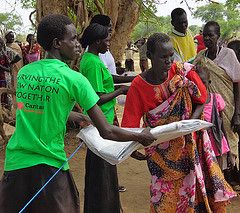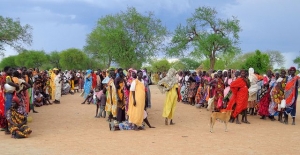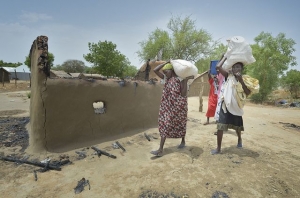
Volunteer staff with Caritas South Sudan during the distribution of plastic sheeting in Agok. Photo by Gabriel Dhieu, CRS
Nyantwic Deng is in despair.
At the edge of the Majak Deng Kaya IDP site in Agok, she sits by herself under a lone tree that she now calls home, staring into the distance. Then she starts to cry.
“I came here with my five children and five of my neighbours. They killed my husband,” she said. Nyantwic is originally from Mayom area in South Sudan’s Unity State. It’s one of the country’s hotspots for violence.
Just like her, 3,500 people have now settled in three camps for people forced from their homes in the small rural town of Agok, about 20 miles southwest of Abyei town in the disputed zone between South Sudan and Sudan. More are expected to come as fighting is anticipated to spread into other areas of Unity State.
Situation dire
With no roof over their heads, these families have to squeeze under the few trees around. Most spend the nights in the open, vulnerable to the elements as strong winds and rain storms.
Food is a luxury that most can’t afford and so most rely on one meal a day. There are no sanitary facilities in the camps, posing a risk of disease. “We’ve lost everything. My youngest child is seven months. How do I buy him milk?” said Nyantwic.

Caritas is reaching desperate families in South Sudan such as here in the Majak Denga Kaya IDP site in Agok, where women recieve plastic sheeting for shelter. Photo by Gabriel Dhieu, CRS
Caritas is among the first humanitarian agencies to respond to the needs of IDPs here in Agok. Through the national Caritas, some 250 plastic sheeting materials donated by Cordaid and another 1000 NFI kits from the ACT alliance member Norwegian Church Aid ( NCA) have also been distributed to the most vulnerable families.
Fr Biong Kuol, the assistant parish priest for Abyei has been on the frontline, helping these families start again.
“Caritas and the Church continue to respond to the people’s needs but it is still not enough,” he said. “Look around and you will see that it’s the innocent women and children who are paying the price of this fighting by sleeping out in the rain. This is the time to intervene.”
This is not the first time Agok has become a safe haven for families caught in conflicts. Just three years ago, an estimated 100,000 people came here fleeing war in Abyei town. The small town with a vibrant market was barely getting back to its feet.
Breaking cycle of violence
For Caritas, more needs to be done to not only help families start over but to break the vicious cycle of violence and war.
“It’s encouraging to see how this small town with not much to offer, has turned out to be a refuge for thousands of families,” said Gabriel Yai, the Director for the national Caritas in the country’s main capital, Juba.
“Caritas member organisations, the national Caritas here in South Sudan are working to alleviate suffering for affected families here and other accessible areas. It’s time to listen to the voice of the voiceless,” he said.

Displaced women walk past burned homes as they return to Bor, a city in South Sudan’s Jonglei State that has been the scene of fierce fighting in recent months. Photo by Paul Jeffrey for Caritas
Humanitarian agencies and the UN have called for a ’30 Days of Tranquillity’ period, expected soon after the warring parties meet face-to-face in the Ethiopia-based peace talks. This will be the first time the party leaders meet face to face since the start of the war.
The 30 Days of Tranquillity will represent a new ceasefire to the country-wide fighting, with the hope to take the farmer back to their farms and displaced families back to safety.
Nyantwic, however, is determined to stay. “I’m not moving. I’m safe here,” she said.
More donations are needed to enable the national Caritas and Caritas agencies to respond to the needs of affected people like Nyantwic. Caritas agencies need an additional €1 million on top of the already pledged sum of €585,000 to mount relief operations in hard to reach areas.
